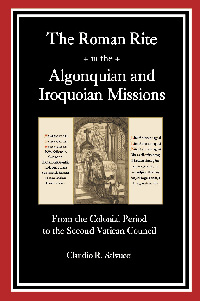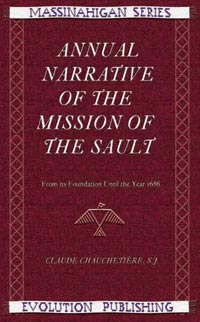
The Roman Rite in the Algonquian and Iroquoian Missions
From the Colonial Period to the Second Vatican Council
Claudio R. Salvucci
Representing the first general treatment of the "Indian Mass" of the North American Catholic missions, this volume draws on historical descriptions as well as rare missionary manuscripts and publications to trace the development of the distinctive American Indian liturgies from the early hymn singing of the mid-1600s to the adaptation of vernacular plainchant and polyphony. Weaving together extensive primary source quotations, Salvucci overturns popular misconceptions of missionaries as cultural imperialists, showing instead how native congregations and scholarly priests worked together in adapting the rich traditions of Counter-Reformation Roman Catholicism to the linguistic and cultural needs of the New World.
This volume further compares and contrasts the Indian Masses of different missions with each other and with the official Roman Missal. It also contains chapters on the calendar and hagiography of the missions; formulas for Baptism, Matrimony, and other sacraments; the Divine Office; characteristic sacramentals and devotions; and religious life. Extensive appendices are included, such as the entire text of a Mohawk Indian Mass; propers and ordinaries for other missions including those of the Algonquins, Abenaki, and Micmac; a complete liturgical calendar; and short descriptions of the most important missions.
Massinahigan Series, 5
July 2008 ~ 160 pp. ~ Hardback ~ 978-1-889758-89-3 ~ $44.95
You can order from Evolution Publishing here.
I'm very proud of this book...at the moment I am having it vetted by some folks in the field to make sure I didn't say anything titanically dumb.




4 comments:
What a fascinating topic! I do hope to read it this year but, and please forgive my honesty, the price is a bit high. Nevertheless may Our Lord reward you for your endeavour.
Thanks a.b.! This is an academic and scholarly work, which are always priced significantly higher than your average general interest book. If the publisher can't make money by selling millions of copies (which, realistically, is the case here), then they have to price accordingly. Or else they couldn't afford to put it out at all, which I view as the greater evil. ;)
One thing I can recommend if you can't afford it personally--go onto the website of your local library or ask at the reference desk. They often have ways for you to recommend titles for purchase. If the library picks it up, then you can read it for free!
Al Maseeh Qaam !
I am glad to have finally found your blog (and perhaps a means by which to dialog with you on the subject of Mission Uses).
I am not sure if you happened upon my comments on New Liturgical Movement regarding your text. If you have not I ask that you review them when you can.
Yours in Christ,
Jonathan
P.S.: Feel free to contact me if you wish. I also ask that you not be offended by my comments, but see them as constructive criticism. I do not at all intend ill will on you or your work, quite the opposite actually. Your work actually got my gears going for ways in which the sacred from The Old Religion could be transformed in light of The True Faith. Not to mention learning as much as I can about my Native and African kin and perhaps aid in the development of New Theological Discourses stemming from the philosophies of these groups. Lets face it, Plato, Aristotle, etc. are all good, but they are not universal approaches to how every culture understands The Divine. For the most part these are foreign ideals which perhaps hinder the conversion of said groups.
I for one assist at a TLM EVERY Sunday (FSSP) and I feel totally alienated by the culture of the people who assist there (and lost at Mass in general (I've been going for over 2 years now, so it has nothing to do with my not understanding what is going on.). I feel more comfortable while assisting at a Melkite Divine Liturgy. Am I saying one is superior to the other, no, but I am saying that perhaps I am not the only one who feels this way.
Perhaps I would feel more comfortable at an organically developed Mission Use, but as you stated in your text (see quote below), I do not see this trend changing anytime soon.
“In the late 1800s and the early 1900s however, there seems to have been something of a shift in ecclesiastical tolerance of such communities. Many Catholic prelates of North America, taking a cue from the general American spirit of the time, saw in the native way of life a doomed and useless vestige of a bygone era. Well meaning ecclesiastics began to make a concerted effort to eradicate the “Indianness” of the mission towns and to encourage them to conform in culture, behaviour, and language to the Anglo-Saxons around them,… .” - Claudio R. Salvucci, The Roman Rite in the Algonquian and Iroquoian Missions: From the Colonial Period to the Second Vatican Council (MASSINAHAGAN SERIES, Vol.5, 2008) xii
My comments are authored Jonathan: http://www.newliturgicalmovement.org/2008/04/roman-rite-in-algonquian-and-iroquoian.html
Jonathan--
Thanks for writing. I'd like to address some of the points you made more in depth...and I'd also like to do it within a context of a separate post so that it will be more visible--if that is ok with you. (As you may have noticed, I do not update this blog terribly often).
Let me just say before I do though, that though I think the *implications* of the work have relevance to other Indian tribes, in terms of the liturgy it focuses (as the title indicates) only on the Algonquian and Iroquoian tribes. There are many anthropological issues you bring up that are interesting and relevant (e.g. the Carlisle Indian School)--but this is not an anthropological book. It is a liturgical one that touches on a few anthropological issues.
My focus on these two language groups also explains why I do not touch on the time period of the 1400s and 1500s. These areas of North America were not settled in earnest until Champlain at the dawn of the 1600s. Whatever happened in the rest of North America is, I do not think, completely relevant to the discussion and rather tends to perpetuate the pan-Indianism that you rightly are critical of.
Let me read your posts more in depth and, when I have more time, prepare a reply. And thanks for giving me a chance to clarify some of these issues.
Post a Comment